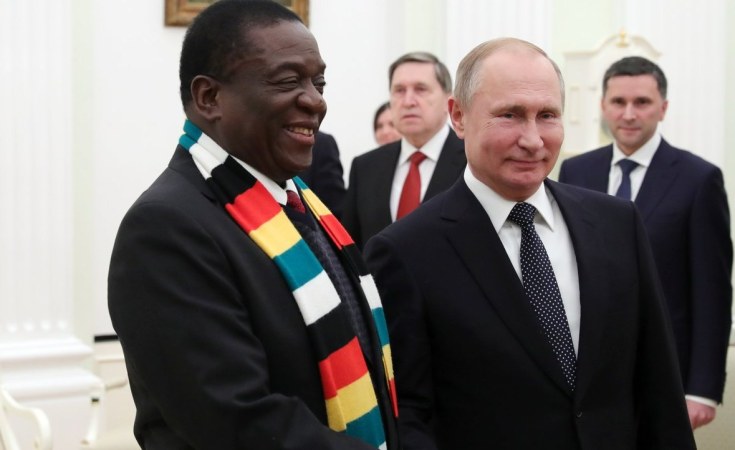Russia has donated grain to Zimbabwe to help the country weather its devastating drought, but is it purely humanitarian? Millions face hunger, and while the aid is welcome, experts question Russia's motives.
Zimbabwe has received a timely donation of 25,000 metric tons of wheat and 23,000 tons of fertilizer from Russia as a humanitarian response to the southern African nation's devastating drought.
Most crops planted during the 2023-2024 farming season have failed due to the El Nino climate phenomenon, leaving over 3 million people at risk of hunger.
Enny Nyashanu is one of the victims of failed crop harvests and she said the situation is dire.
"I had high expectations from this crop," the 79-year-old told DW. "I was certain we would survive from our harvest. But there is no hope nor anywhere to run to. The whole country is like this."
Across Zimbabwe, particularly in Manicaland province's Buhera district, crops have withered and died.
"There is nothing in the fields. We are desperate for rains," said one resident at a food distribution center. "We have lost hope to harvest anything from the fields."
The UN's World Food Programme (WFP) has been struggling to keep up with the demand for food assistance.
"Funding has been a challenge, and it will continue to be a challenge," according to Sherita Manyika from WFP Zimbabwe.
The WFP is funded entirely by voluntary donations and Manyika said there is a huge financial shortfall.
Russia to the rescue?
The Russian donation -- part of a larger pledge of 200,000 tons of grain made by the Kremlin to African countries during the 2023 Russia-Africa summit -- could therefore, be a timely succour for Zimbabweans.
Zimbabwe is one of six African nations, including Burkina Faso, Mali, Eritrea, Central African Republic and Somalia, to receive grain from Russia.
Zimbabwean President Emmerson Mnangagwa expressed heartfelt appreciation for the timely donation, extending gratitude to Russian President Vladimir Putin for his generosity.
"On behalf of the people and government of Zimbabwe...I express my deep gratitude to my dear brother, the President of the Russian Federation," Mnangagwa remarked during the official handover ceremony.
For many Zimbabweans, the hope is that such help can be long term, to ensure their survival.
"We are hoping these food handouts will continue for our families to survive. We have no other means to source for food," a woman at the food distribution centre told DW.
Russia's motivations questioned
While the grain donation is a welcome relief for Zimbabwe, some experts question Russia's motives in Africa.
Alex Vines, director of the Africa Program at Chatham House, a think tank headquartered in London, believes that Russia's donation is more about political strategy than pure humanitarianism.
"This is not tightening Russian diplomacy in Africa, it is rewarding the best allies of Russia, or countries that Russia wants to increase its engagements with," Vines told DW.
He pointed out that other African countries, arguably in greater need, were not included in the grain deal, "so this is a political statement rather than a humanitarian one," he suggested.
Moreover, Zimbabwe's strained relationship with Western powers makes it an attractive partner for Russia to showcase its influence.
"Zimbabwe is a country that has a poor relationship with the West ... It is a political statement to show that they have other partners and Russia is one of those," Vines told DW.
By providing essential resources, Russia is positioning itself as a dependable ally, filling a void left by strained Western relations.
Russia 'overstretched' due to Ukraine war
As the aid deliveries continue, questions arise about the long-term implications of Russia's engagement with Africa, particularly under Putin's continued leadership.
Despite the prospect of more grain deals and strengthened ties, Vines cautions that Russia's capacity for sustained involvement in Africa may be limited by its ongoing commitments elsewhere, notably the conflict in Ukraine.
"While Russian strategy is to engage the African continent...the reality is that Russia is overstretched," Vines said. With resources diverted to other priorities, including military efforts, Russia's ability to maintain its foothold in Africa may face challenges.
For the Zimbabwean government the focus is on assuring its citizens that no one will starve.
"The registration of food insecure people and the distribution of grain has commenced in all areas across the country's eight rural provinces. The registration of beneficiaries and distribution of grain will continue unabated during the El Nino-induced drought period," said Zimbabwean Information Minister Jenfan Muswere.
Future of Russia-Africa relations
As Putin secured a fifth term as Russia's president, it remained uncertain if more grain dealsand stronger relations between Moscow and Africa were on the horizon.
Vines believes Russia's resources are stretched thin due to the war in Ukraine.
"We see a significant decline in defence aid to African countries, because of the redirection of military equipment for the war efforts that Russia is engaged in," he said.
The implication, according to the expert, is that this potentially opens doors for other countries, such as China, to increase their influence in Africa.
This article has been adapted by Mimi Mefo Takambou from a report by Privilege Musvanhiri and Okeri Ngutjinazo broadcast on DW's AfricaLink podcast.


